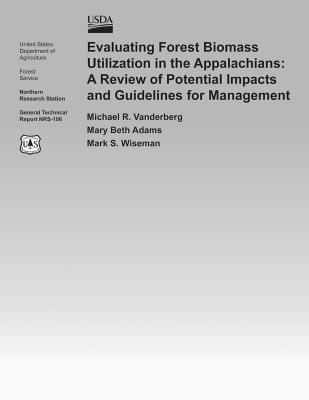
- We will send in 10–14 business days.
- Author: United States Department of Agriculture
- Publisher: CreateSpace Independent Publishing Platform
- Year: 2015
- Pages: 42
- ISBN-10: 1505847842
- ISBN-13: 9781505847840
- Format: 21.6 x 28 x 0.2 cm, softcover
- Language: English
- SAVE -10% with code: EXTRA
Evaluating Forest Biomass Utilization in the Appalachians (e-book) (used book) | bookbook.eu
Reviews
Description
Forests are important economic and ecological resources for both the Appalachian hardwood forest region and the country. Increased demand for woody biomass can be met, at least in part, by improved utilization of these resources. However, concerns exist about the impacts of increased intensity of woody biomass removal on the sustainability of forest ecosystems. Relatively little research has evaluated the impacts of forest biomass harvesting on site productivity, biodiversity, water quality, or other measures of ecosystem productivity, and new information about these and other related topics is not readily available. This report discusses the implications for the sustainability of Appalachian hardwood forests if additional woody biomass is removed for the production of woody biomass-related energy. It includes a summary and synthesis of published literature and ongoing studies to evaluate the possible effects of increased biomass removal on several primary aspects of forest sustainability (i.e., site productivity, water quality, wildlife and biodiversity, wood supply). general management guidelines are proposed that can minimize the impacts of woody biomass utilization on the sustainability of Appalachian hardwood forests. Accompanying the report is an online bibliography, containing references for scientific literature related to woody biomass harvesting and utilization beyond the scope of the Appalachian forest region.
EXTRA 10 % discount with code: EXTRA
The promotion ends in 18d.07:19:03
The discount code is valid when purchasing from 10 €. Discounts do not stack.
- Author: United States Department of Agriculture
- Publisher: CreateSpace Independent Publishing Platform
- Year: 2015
- Pages: 42
- ISBN-10: 1505847842
- ISBN-13: 9781505847840
- Format: 21.6 x 28 x 0.2 cm, softcover
- Language: English English
Forests are important economic and ecological resources for both the Appalachian hardwood forest region and the country. Increased demand for woody biomass can be met, at least in part, by improved utilization of these resources. However, concerns exist about the impacts of increased intensity of woody biomass removal on the sustainability of forest ecosystems. Relatively little research has evaluated the impacts of forest biomass harvesting on site productivity, biodiversity, water quality, or other measures of ecosystem productivity, and new information about these and other related topics is not readily available. This report discusses the implications for the sustainability of Appalachian hardwood forests if additional woody biomass is removed for the production of woody biomass-related energy. It includes a summary and synthesis of published literature and ongoing studies to evaluate the possible effects of increased biomass removal on several primary aspects of forest sustainability (i.e., site productivity, water quality, wildlife and biodiversity, wood supply). general management guidelines are proposed that can minimize the impacts of woody biomass utilization on the sustainability of Appalachian hardwood forests. Accompanying the report is an online bibliography, containing references for scientific literature related to woody biomass harvesting and utilization beyond the scope of the Appalachian forest region.


Reviews